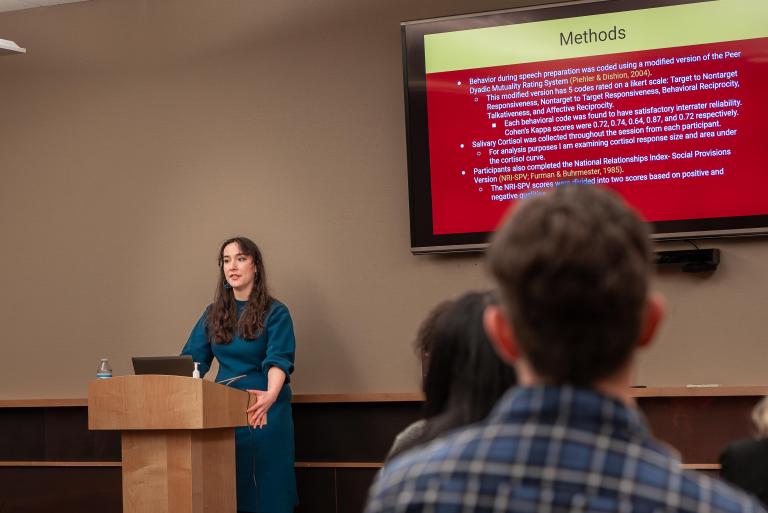News
ICD senior presents research project on friendship quality and stress at CEHD Research & Innovation Day

This spring, ICD senior developmental psychology student Carolyn Sackett was selected to present their Undergraduate Research Opportunities Program (UROP) project at the College of Education and Human Development's (CEHD) Research and Innovation Day. Carolyn is preparing to graduate this spring with a major in developmental psychology and a minor in statistics.
How did you learn about developmental psychology and why did you decide to major in it?
I learned about developmental psych my freshman year of high school when we learned about the different fields of psychology in my psych class. I knew I wanted to work in youth mental health, so dev psych felt like the perfect major.
What research lab are you working in and what are your research interests?
I work as an undergraduate research assistant at the [Gunnar Lab for Developmental Psychobiology Research] and I have worked/volunteered here for the last two years. I am particularly interested in research regarding stress, psychopathology, and peer relationships. I am especially interested in researching adolescence.
Please tell us a little more about your UROP project.
Using previously collected data and an edited coding manual I altered myself, I examined the relationship between friendship quality and stress buffering during the online Trier Social Stress Test (TSST-OL). Participants were aged 11-15 and completed the TSST-OL with a friend. Friendship quality was measured using the altered coding manual and survey responses, stress levels were measured using salivary cortisol. I found that friendship quality does NOT impact stress buffering. Having a friend there, regardless of how good that friend is, decreases stress enough already.
Why are you interested in this topic?
I worked on the Share the Load (STL) study in the Gunnar Lab which is where the data for my UROP came from. In the STL study, participants complete the TSST-OL in a variety of conditions: alone, with a random peer, with a friend whose only job is to cheer you on, or with a friend who is also completing the TSST-OL. After helping to collect data for the STL study I started to wonder if friendship quality matters when it comes to participants’ stress levels. Understanding how peer relationships impact mental health and stress levels in tweens/teens is very important to understanding adolescent mental health as a whole. Given the fact that mental health issues are on the rise, I am interested in understanding the more specific aspects of this stress/peer relationships interaction.
How do you think participating in research enhanced your undergrad experience?
Doing this UROP project helped me understand that I enjoy research and want to continue doing research in my career, hopefully by going to graduate school. A lot of times as an undergrad, when we participate in research it is only as an assistant so we cannot answer the specific questions that we want to ask. Having the opportunity to do my own UROP allowed me to answer my own questions and learn how leading a research project actually works.
What are your future plans?
After graduation I plan to work at the ABCD study here at the U. I’m excited to get experience with MRI research in this position as well as more direct experience studying psychopathology in the form of researching substance use. In the long run, I hope to go to graduate school to study psychopathology prevention/resilience for specifically adolescents.